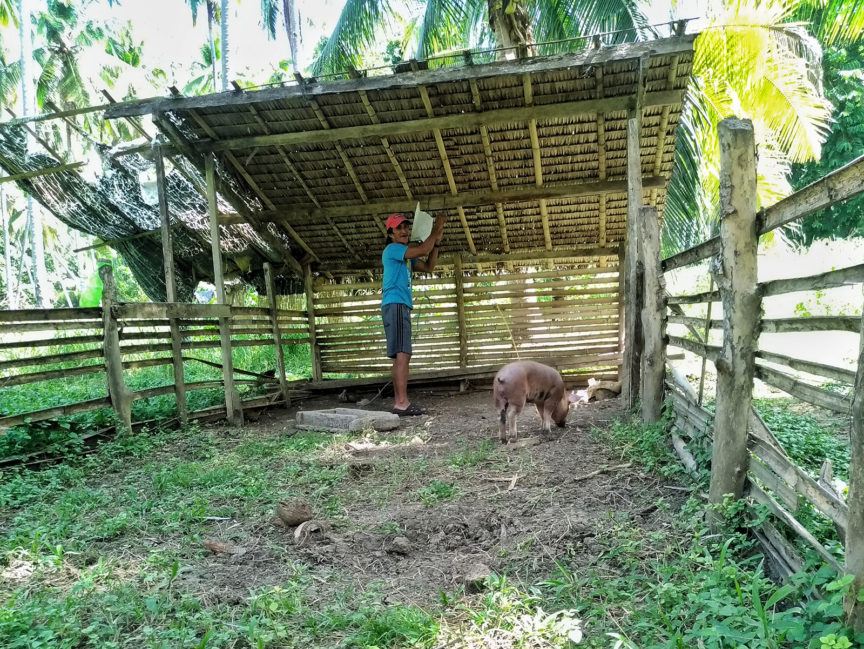 A resident of Don Marcelino, Davao Occidental tends his only remaining pig on 5 February 2020 after losing five of them to African Swine Fever. MindaNews photo by MANMAN DEJETO
A resident of Don Marcelino, Davao Occidental tends his only remaining pig on 5 February 2020 after losing five of them to African Swine Fever. MindaNews photo by MANMAN DEJETO
DON MARCELINO, Davao Occidental (MindaNews / 7 February) – In the neighborhoods of this town and nearby Jose Abad Santos, most residents raise their native pigs literally without borders, free to roam the neighborhood like stray dogs.
Free range growing has been the practice of many backyard pig growers in the province who are now feeling the crunch of the African Swine Fever (ASF) outbreak that killed close to 3,000 pigs in Don Marcelino alone.
The outbreak prompted Davao Occidental, which was carved out of Davao del Sur in 2016 to become the country’s 81st province, to place the entire province under a state of calamity.
To contain the spread of the highly contagious hemorrhagic virus, Davao Occidental Governor Claude Bautista pushed the depopulation of pigs across the province, in close coordination with the Department of Agriculture (DA).
The culling in Don Marcelino, the ground zero of ASF in Mindanao, started on Wednesday, with MindaNews seeing workers tasked to do the job clad in protective suits.
For housewives like Angela Albarracin, a resident of Barangay Lapuan, pigs are like savings banks ever so reliable in times of dire straits.
“This is devastating to our livelihood,” she told MindaNews, her husband nearby, under tall coconut trees, tying their lone surviving lechon (roasted)-size native pig for turnover to workers tasked to cull the pigs.
“For us, pigs are very important. We can easily turn them into cash during emergency or difficult times. There are ready buyers coming to our backyards,” she added, speaking in Cebuano.
Albarracin lost six pigs, including a sow, in the ASF outbreak. For surrendering their only surviving pig, the family would get P5,000 from the DA, they were told, “within 1 ½ to two months.”
Usually, a lechon-size pig costs P3,500 to P3,800 which are bought by “bukag-bukag” traders to be sold to the markets in big cities such as Davao and General Santos.
Bukag-bukag refers to small traders who use motorcycles with baskets on both sides for transporting the pigs.
Albarracin noted that her fellow villagers refrained from volunteering to cull the pigs for burying at a common pit because “we cannot stomach to see them gone due to their big help to us.”
She said that during Wednesday’s meeting at the village gymnasium, residents were told that they can access a loan amounting to P30,000 per family from the national government, payable in three years without interest.
Backyard hog raising won’t resume in the town “for two to three years” to give way for the total elimination of the ASF virus, Rosalyn, Albarracin’s daughter-in-law, said.
Medeline Mallari, barangay chair of Lapuan here, said that at least 900 pigs in her village alone died due to the ASF outbreak that erupted in the town in the second week of January.
As of Tuesday, she said at least 791 pigs survived the ASF outbreak. Lapuan was among the first villages in Don Marcelino where the culling started Wednesday.
“This is saddening considering that pig growing is a main source of livelihood for many of our constituents,” she told MindaNews in Malita on Tuesday, where an emergency meeting for municipal and village officials was convened by the provincial government.
Some 50 kilometers away from Don Marcelino, Alberta Tilad, 48, said she has been fervently praying that the contagion would not affect her pigs – 16 “baktins” or small ones and two sows.
Tilad’s family lives in Barangay Mangili, the first barangay in Jose Abad Santos after Don Marcelino.
“If the government will ban pig raising here, we will be forced to stop sending our six children to school. Pig raising is a very big help as a source of quick funds to many of us,” she told MindaNews.
While her pigs were still alive last Wednesday, village officials asked her to surrender them for culling, based on the instruction of the provincial government. so she can avail of the P5,000 assistance per head from the DA.
Mangili Barangay Captain Leslie Rubia told MindaNews that at least 755 pigs have died due to ASF since the last week of January, following the outbreak in Don Marcelino town.
“Every day since the last week of January, we have been receiving reports of dead pigs from our constituents,” Rubia said.
Samples have been taken to confirm if the cause of the pigs’ deaths was ASF, but the results were not known to Barangay Mangili as of Wednesday afternoon.
Rubia suspected the disease could have been brought in his village by bukag-bukag traders coming from Don Marcelino, and spread fast because the pigs were free to roam.
Rubia admitted that free range pig growing has been a prevalent practice ever since.
Only some raise their pigs entirely in pens, he said, adding many let loose their pigs in the neighborhood because they would just return to their owners at the end of the day.
MindaNews saw several pigs roaming along or crossing the roads on the way from Don Marcelino to Jose Abad Santos, raised mainly by backyard growers. (Bong S. Sarmiento /MindaNews)
